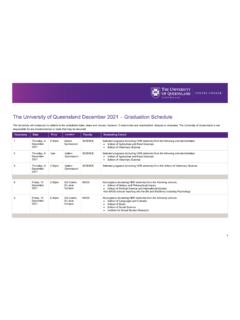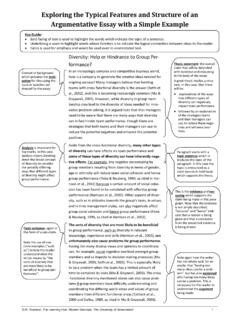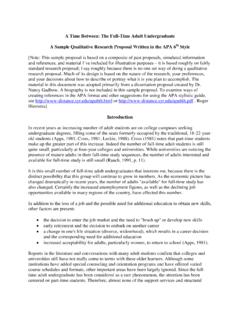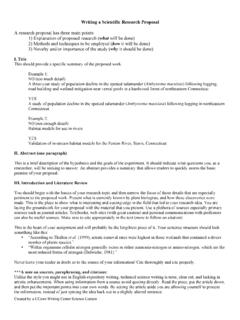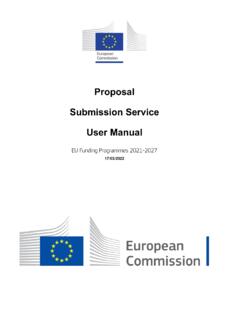Transcription of Reviewing the Literature: A Short Guide for Research Students
1 D. R. Rowland, The Learning Hub, Student Services, The University of Queensland 1 Reviewing the literature : A Short Guide for Research Students In brief: Reviews of previous literature in a thesis or Research paper are not summaries of every article you have read, but rather an exposition of the existing knowledge and reasoning which led you to believe that what you did was worth doing in the way that you did it, written so as to convince the reader of these things. Writing about the literature is not just part of what you have to do , it is a valuable way to learn the literature , to get it off the page and into your head.
2 And that is essential if you are to be able to think critically about your field. Contents 1. Purposes Guide focus, depth and design .. 2 2. Common problems and how they can be addressed .. 6 3. Getting your review organised with a mind map .. 8 4. Illustrative example of possible focus questions for the initial parts of a confirmation document .. 9 5. Illustrative example of problem solving Research : An outline of the introduction from a Research article .. 10 6. Signposting .. 11 7. Hedges and boosters / critical review language .. 14 8. Evolving a piece of writing from first thoughts to a polished product.
3 16 9. Focusing and organizing your literature review with a mind map: two more examples .. 18 10. Approaches to note-taking .. 20 D. R. Rowland, The Learning Hub, Student Services, The University of Queensland 2 1. Purposes Guide focus, depth and design One set of purposes is to explain the motivations for doing your Research . Your aims are to: a. convince the reader that the Research area is significant / important / interesting You re trying to convince the reader to read on and also providing context to help them see the bigger story of which your Research is a part. From your perspective you are answering the question: Why did I think that doing Research in this general area would be interesting and important (in some sense)?
4 B. convince the reader that we shouldn t be (completely) satisfied with the existing literature on the topic and that your Research will fill some important or interesting gap or address some important limitation or deficiency To do this you need to critique the prior literature ; if there s no gap or limitation or deficiency with the prior Research , why is there a need to do more in the area? Your question: What made me think that more Research in the particular sub-area that I chose was warranted? Another set of purposes is to explain why your Research took the precise directions it pursued. Possible aims here are to: c.
5 Explain and justify your Research hypotheses / ideas What theory and/or prior experimental results suggested to you that your hypotheses were * are if you are writing a Research proposal ] likely to be true / ideas were likely to be fruitful? This necessitates arguments, because if things are certain, you don t have hypotheses, you have facts and there is no need to do any Research ! d. Explain how the historical context for your Research guided what you did But only if that is important for understanding where your Research fits into a bigger picture or if understanding the past is helpful for understanding the present and giving direction for where your Research needs to go.
6 For example, a legal studies thesis might review the evolution of legal thinking and policy in an area in order to see what issues have been considered and addressed which will help identify what still needs to be worked on and so that new proposals take into account the lessons of the past. Malaria remains one of the world s greatest public health challenges.. Today, an estimated 40% of the world s population remains at risk of malaria, with 500 million cases annually, resulting in 1 2 million deaths, mostly of young children, each year.. The development of widespread resistance to relatively inexpensive drugs (such as chloroquine), the difficulty of.
7 Have meant that poorer tropical countries have been unable to control malaria.. The development of an effective and inexpensive vaccine is thus a major focus of Research . Source: Good et al. (2005), Annual Review of Immunology, 23, 69-99. The smart antenna is one of the promising techniques to overcome problems of multipath propagation and co-channel interference [in wireless communication networks]. In general, it is classified into switched-beam and adaptive arrays *1+.. The advantages of the switched-beam antenna are the simplicity of its tracking algorithm and low cost. However, it is limited in terms of combating interference.
8 The adaptive array offers better performance in terms of fighting interference. However, this is at the expense of higher costs associated with the sophisticated signal processing algorithm and complicated hardware implementations. In this paper, we describe .., which provides an intermediate solution.. Source: P. Ngamjanyaporn, M. Krairiksh and M. Bialkowski (2005), Microwave and Optical Technology Letters, 45, 411-415. Knowing that some heart attacks are caused by blood clots forming in coronary arteries partially blocked by plaque build up, and that aspirin reduces the ability of blood to clot, one might form the hypothesis that perhaps regularly taking small doses of aspirin might reduce the incidence of heart attacks in at-risk populations.
9 The reason Research is needed is because while the idea sounds great in theory, perhaps in practice taking a dose small enough to avoid problems such as gastro-intestinal or cranial bleeds would not lead to any significant reductions in heart attack rates. Inspired by: Physicians Health Study ( ) D. R. Rowland, The Learning Hub, Student Services, The University of Queensland 3 A third set of purposes is to explain why you conducted your Research in the way that you did. Possible aims here are to: e. explain and justify your choice of theoretical framework Theory guides what to look for when collecting data (because theory can be used to make predictions) and also helps you analyse and interpret what you find, so writing critically means moving beyond simply summarising the theory to explaining how it will Guide Research design and data interpretation and also noting any limitations and how you intend to deal with these (see Sutton & Staw (1995) in the references for this section for some common errors in the ways some authors try to do these things).
10 If there is a choice of theoretical perspectives you could take (sometimes captured by the phrase, schools of thought ), then you would also need to justify your choice. Your questions: What did I need to know to design my experiments / come up with my experimental or analytical approach / come up with my Research questions / interpret my findings? Why did I think the perspective I chose is the best one for investigating my Research questions? f. convince the reader that your Research methods are sound and were well thought through What approaches could have been used for your Research ? Why did you think the approach you chose was the best one given any constraints?

